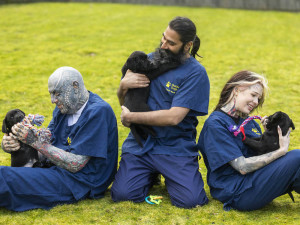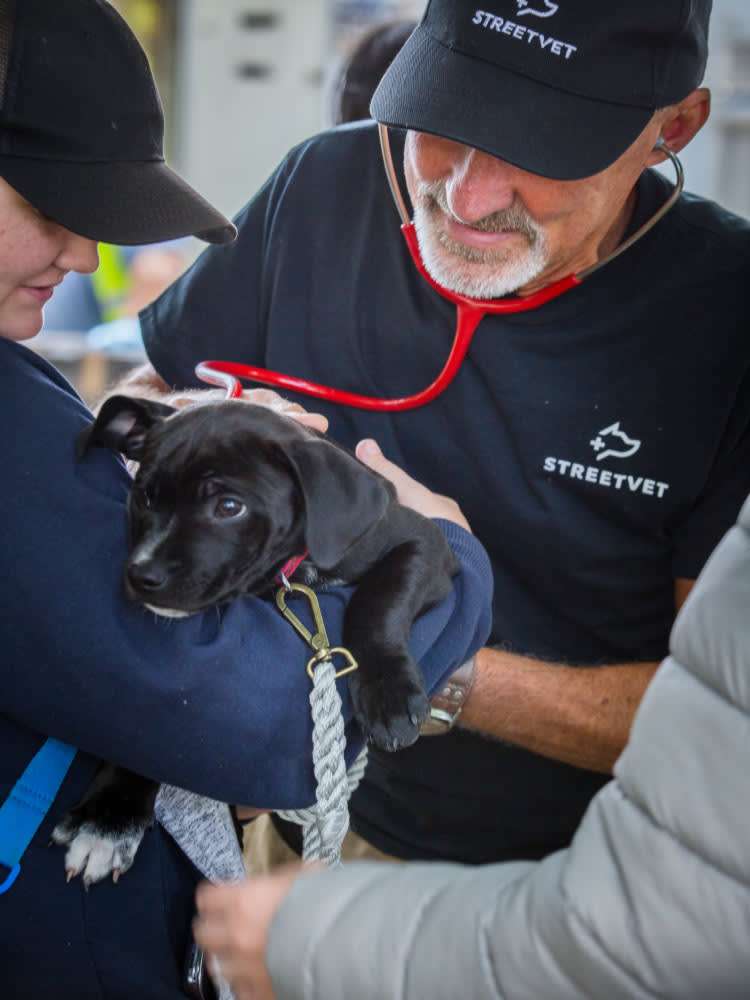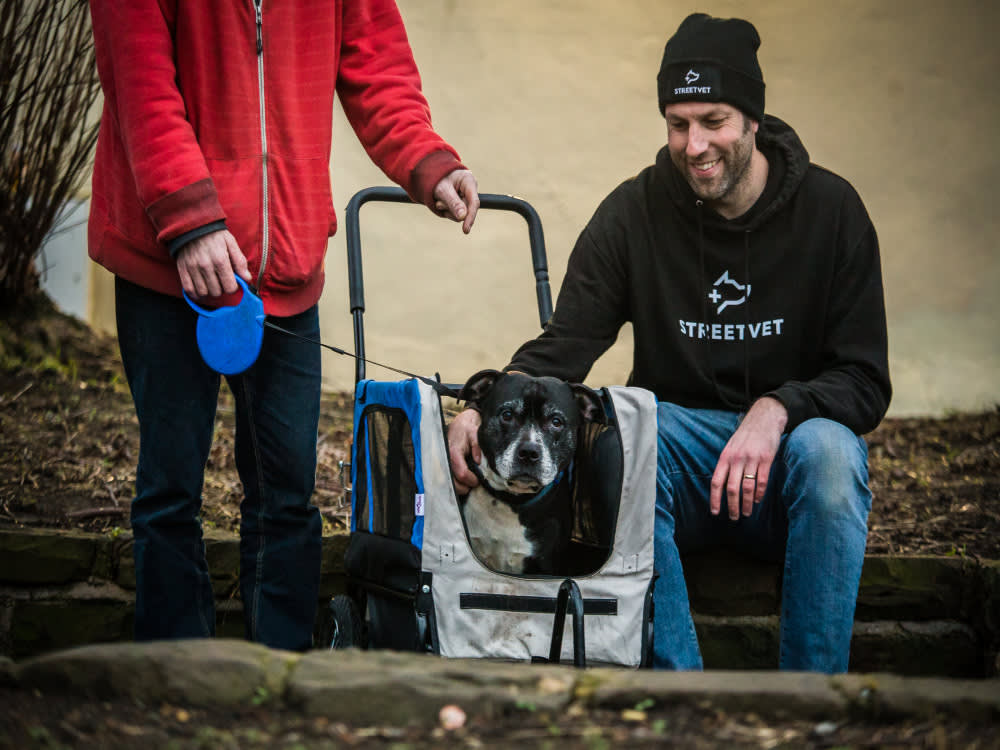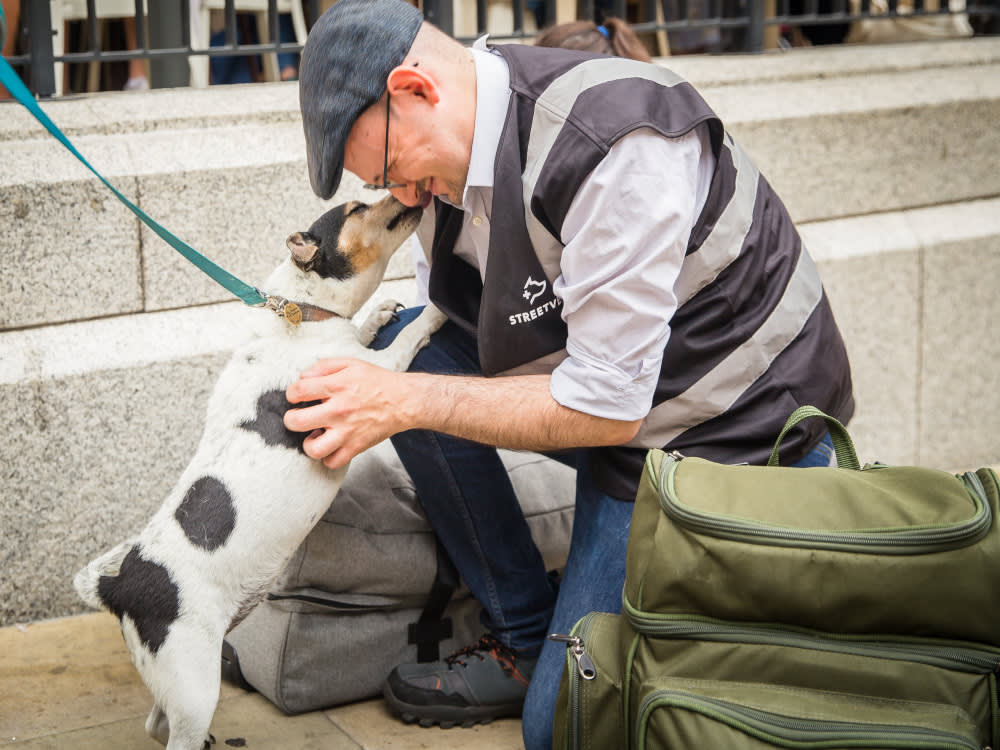How StreetVet Supports People and Their Pets Experiencing Homelessness
Meet the charity that helps protect the animal-human bond
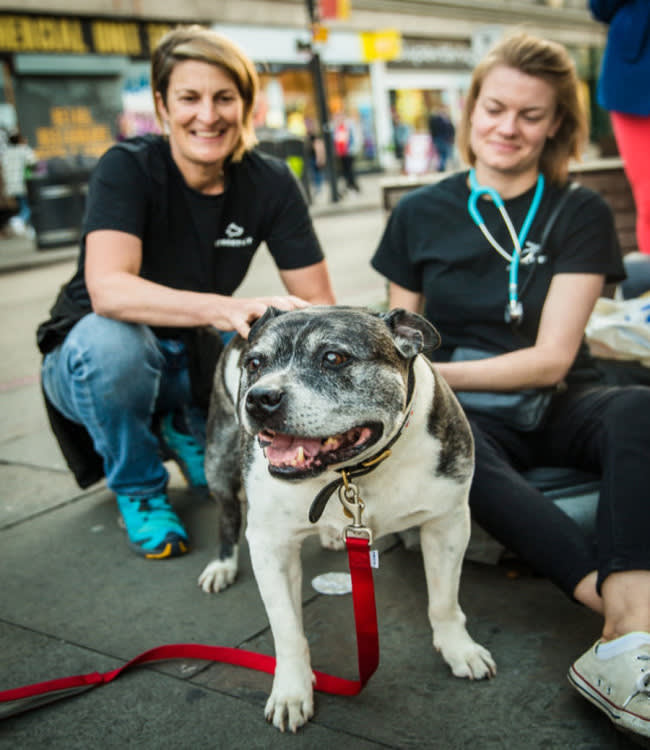
share article
The bond between humans and animals is strong, with many people finding it difficult to imagine life without their pets. These bonds are often even stronger for pet parents experiencing homelessness – but those people are also faced with the additional difficulties of trying to access vet care for their beloved companions.
With homelessness on the rise in the UK (the number of people estimated to be sleeping rough on a single night in autumn 2023 had risen by 27 percentopens in a new tab since 2022), we spoke with national charity StreetVetopens in a new tab, to discover more about their work providing free and accessible vet care and services for the pets of people experiencing homelessness.
What is StreetVet’s mission?
StreetVet aims to protect the human-animal bond, by keeping pets and their humans together. Founded in 2016 by two vets, Jade Statt and Sam Joseph, StreetVet has created an extensive network of nearly 600 vet and vet nurse volunteers, who provide free, accessible vet care and services for homeless people across the UK.
StreetVet’s head of marketing, Colette Sheaff, explains that one in four people experiencing homelessness in the UK has a pet. Often, they were already a pet parent before they became homeless, so this service is a vital lifeline for them.
What does a typical StreetVet session look like?
When heading out on consultations, each StreetVet brings a backpack full of equipment. Anything that can be done in a vet consulting room – from vaccinationsopens in a new tab and microchips to blood tests and nail clippingopens in a new tab – can be completed during a StreetVet consultation.
Some common treatments include eye and ear medication, routine fleaopens in a new tab and worm treatments, and pain relief for conditions like osteoarthritis. Tim Sandys, a StreetVet volunteer covering Gloucester, explains how rewarding he finds this work: “As a vet, I love to see pets get better when they come in with a problem that I can fix. As a StreetVet, I can use these same skills, along with compassion for the pet parent, in a way that makes a huge difference to the animal and their human.”
While dogs make up around 85 percent of StreetVet patients, they also treat other companion animals including cats, rabbits, ferrets, snakes, tortoises, rats, and even a bearded dragon!
If a pet needs additional care that can’t be managed on the street, for example, neutering or dental care, StreetVet books them into a local vet practice and covers the costs of any treatment.
What parts of the UK are covered by StreetVet?
StreetVet covers the whole UK – from Aberdeen to Penzance and everywhere in between. Outreach sessions across the 23 locations are run depending on demand, so while some areas have weekly sessions, others will be fortnightly or monthly.
These sessions are often run with a grassroots organisation, including soup kitchens and hostels. This approach helps build trust within the homeless community, as there’s often fear that their pet may be taken away. Outside of outreach locations, StreetVet also provides funded vet care on an emergency basis, for anyone eligible.
How can homeless people access StreetVet’s services?
In addition to regular outreach sessions, StreetVet offers support via a formopens in a new tab on its website. After an eligibility check, the StreetVet team triages and manages the cases.
Once a patient is registered in the StreetVet system, they’re offered support with anything else they need, from food and treats to collars, harnesses and blankets. They’re also given an ID tag with 24/7 access to StreetVet services outside regular outreach sessions.
How can members of the public support StreetVet?
Homelessness in the UK is on the riseopens in a new tab, driven in part by the cost-of-living crisis and unaffordable housing. As a result, the demand for StreetVet’s services is growing. But as a self-funded charity, StreetVet has to generate all the funds needed to continue its mission.
Donations from the public are key, with all contributions going directly towards delivering free vet care. In addition to donations, there are plenty of other ways to help. Fundraising eventsopens in a new tab, using schemes like Give as You Liveopens in a new tab, which adds a donation to StreetVet every time you shop at one of 6,000+ participating stores, and choosing StreetVet as your Pets at Home Lifeline Charityopens in a new tab all help the pets and people that StreetVet supports.
On 12 May 2024, StreetVet is holding its first DogDash 5km fun runopens in a new tab in Enfield – a chance to raise vital funds while enjoying a relaxed walk or run with your dog.
How else does StreetVet support homeless people?
Currently, around 90 percent of hostels in the UK don’t accept pets, but research shows that only seven percent of homeless people would consider giving up their dog to access temporary accommodation. If they do refuse, they’re recorded as making themselves voluntarily homeless. But StreetVet believes that no one should ever be forced to make that choice.
As a result, StreetVet launched its Accredited Hostel Schemeopens in a new tab, giving hostels the support they need to accept pets. This includes help writing policies and owner contracts, plus training to provide hostel staff with the knowledge they need to accommodate pets.
There are now 24 accredited hostels across 20 locations in the UK, with another 63 hostels in the process of becoming accredited. So far, 100 pets have been supported through the scheme, with 19 clients and their pets helped into independent living. Each of these pets is eligible to become a StreetVet patient, able to access the same care provided to any outreach patients. They also receive a welcome pack with a bed, bowl, toys, blankets and more, all provided by StreetVet sponsors.
Protecting the precious bond between people and pets
It’s sometimes easy to think that homelessness only affects people sleeping rough on the streets, but it also reflects the situations of people staying with friends, living in temporary accommodation, sleeping in their vehicle and other circumstances whereby someone does not have a permanent home.
StreetVet’s goal is to provide the essential care these pets need while keeping them with their pet parents. “By journeying with the pets and humans through their homelessness, there is no better feeling than helping them stay together, stay well, get treatment when needed, and eventually see them access accommodation together on a pathway out of homelessness for good,” says Tim.
StreetVet is a multi-award-winning charity that provides free, accessible vet care for homeless people caring for their pets. In 2023, volunteers completed 2,307 consultations and supported 735 pets.
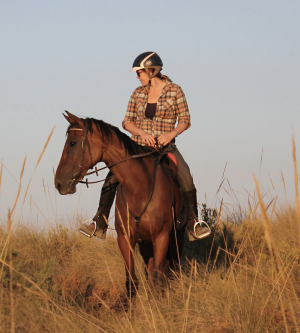
Emma Stenhouse
Emma is a freelance writer whose work has been published by Rover, Vetstreet, Petplan, BeChewy, and more. When she’s not writing, she spends time with her husband, daughter and 15 animals (including dogs, cats, horses and chickens) on their small farmstead in Spain. There’s always a fence to be fixed, trees to plant or animals to be fed!
Related articles
![woman hugging dog]() opens in a new tab
opens in a new tabWhere to Get Help If You’re Struggling to Afford Your Pet
If you’re struggling with pet care costs, you are far from alone and there’s no shame seeking help. Here’s a few places to start
![A woman with dark curly hair lifting a box with a plant in a pot balanced on top to another area in the home]() opens in a new tab
opens in a new tabHow to Prepare For an Adoption Home Visit
7 tips for acing your inspection and bringing your new pup home
![A woman staring at her computer while holding her dog close.]() opens in a new tab
opens in a new tab10 Things to Consider Before Adopting a Pet
It’s a big decision, so tick these boxes before you sign on the dotted line
- opens in a new tab
What Are The Different Types Of Pet Insurance?
Everything you need to know about how pet insurance works in the UK
